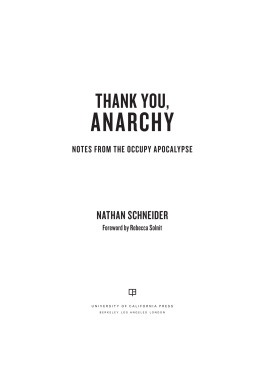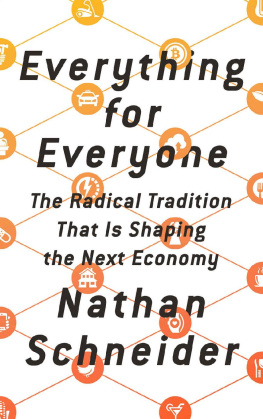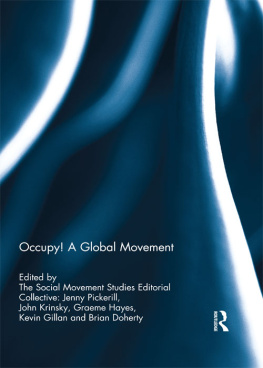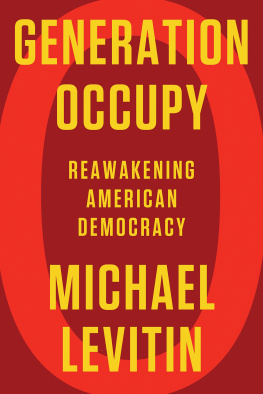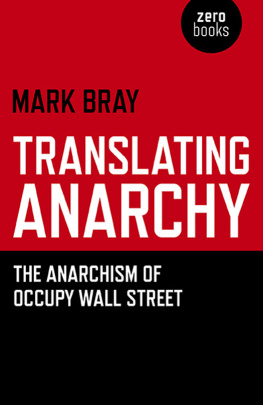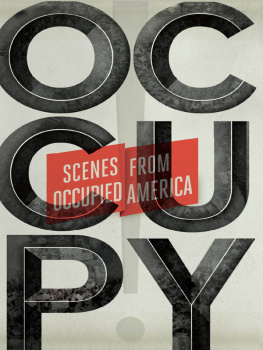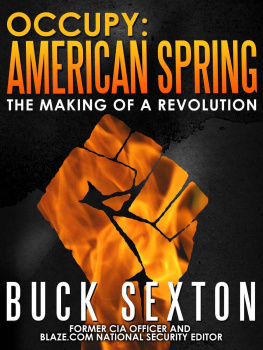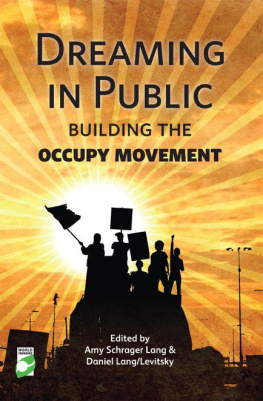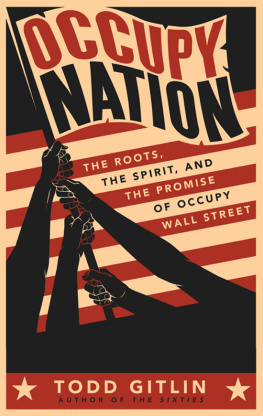
THANK YOU, ANARCHY
The publisher gratefully acknowledges the generous support of the General Endowment Fund of the University of California Press Foundation.
THANK YOU,
ANARCHY
NOTES FROM THE OCCUPY APOCALYPSE
NATHAN SCHNEIDER
Foreword by Rebecca Solnit

UNIVERSITY OF CALIFORNIA PRESS
BERKELEYLOS ANGELESLONDON
University of California Press, one of the most distinguished university presses in the United States, enriches lives around the world by advancing scholarship in the humanities, social sciences, and natural sciences. Its activities are supported by the UC Press Foundation and by philanthropic contributions from individuals and institutions. For more information, visit www.ucpress.edu.
University of California Press
Berkeley and Los Angeles, California
University of California Press, Ltd.
London, England
2013 by Nathan Schneider
Library of Congress Cataloging-in-Publication Data
Schneider, Nathan, 1984.
Thank you, anarchy : notes from the occupy apocalypse / Nathan Schneider; foreword by Rebecca Solnit.
pagescm.
Includes bibliographical references.
ISBN 978-0-520-27679-6 (cloth : alk. paper)
ISBN 978-0-520-27680-2 (pbk. : alk. paper)
eISBN 9780520957039
1. Occupy Wall Street (Movement).2. Occupy movementNew York (State)New York. 3. Occupy movement. 4. Protest movementsUnited StatesHistory21st century.5. EqualityUnited States.6. Income distributionUnited States.I. Title.
HC110.I5S362013
339.20973dc23
2013007879
Manufactured in the United States of America
22 21 20 19 18 17 16 15 14 13
10 9 8 7 6 5 4 3 2 1
In keeping with a commitment to support environmentally responsible and sustainable printing practices, UC Press has printed this book on Rolland Enviro100, a 100% post-consumer fiber paper that is FSC certified, deinked, processed chlorine-free, and manufactured with renewable biogas energy. It is acid-free and EcoLogo certified.
Once to every man and nation comes the moment to decide,
In the strife of Truth with Falsehood, for the good or evil side;
Some great cause, Gods new Messiah, offering each the bloom or blight,
Parts the goats upon the left hand, and the sheep upon the right,
And the choice goes by forever twixt that darkness and that light.
JAMES RUSSELL LOWELL, THE PRESENT CRISIS (1844)
I think you have to engage in almost revolutionary strategies to achieve reform.
FRANCES FOX PIVEN, LECTURE AT NEW YORK UNIVERSITY (FEBRUARY 16, 2012)
CONTENTS
Rebecca Solnit
FOREWORD| MIRACLES AND OBSTACLES
REBECCA SOLNIT
I would have liked to know what the drummer hoped and expected. Well never know why she decided to take a drum to the central markets of Paris on October 5, 1789, and why that day the tinder was so ready to catch fire and a drumbeat was one of the sparks. The working women of the marketplace marched all the way to Versailles, occupied the seat of royal power, forced the king back to Paris, and got the French Revolution rolling. It was then the revolution was really launched, more than the storming of the Bastillethough both were mysterious moments when citizens felt impelled to act and acted together, becoming in the process that mystical body civil society, the colossus who writes history with her feet and crumples governments with her bare hands.
She strode out of the 1985 earthquake in Mexico City: parts of the central city collapsed in that disaster, but so did the credibility and the power of the PRI, the Institutional Revolutionary Party that ruled Mexico for seventy years. These transformative moments happen in many times and places, as celebratory revolution, as terrible calamity, and they are sometimes reenacted as festivals and carnival. In these moments the old order is shattered, governments and elites tremble, and in the rupture civil society is reborn. The old rules no longer apply in that open space of rupture. New rules may be written, or a counterrevolution may be launched to take back the city or the society, but the moment that counts is the one in which civil society is its own rule, taking care of the needy, discussing what is necessary and desirable, improvising the terms of an ideal society for a day, a month, a season, the duration of the Paris Commune or the Oakland Commune (as Occupy Oakland was sometimes called), or the suspension of everyday life during disaster.
Those who doubt that the significance of these moments matter should note how terrified the authorities and elites are when such moments erupt. Those who dismiss them because of their flaws need to look harder at what joy and what hope shine out of them and ask not what these moments produce in the long run but what they are in their heyday (though they often produce profound change in the long runand when it comes to long runs, theres always that official of the Chinese government who some decades back was asked what he thought of the French Revolution: Too soon to tell, he said).
In these moments of rupture, people find themselves members of a we that did not exist, at least not as an entity with agency and identity and potency, until that moment; new things seem possible, or the old dream of a just society reemerges, and for a little while it shines not just as a possibility but as how people live with one another. Utopia is sometimes the goal, its often the moment, and its a hard moment to explain, since it usually involves hardscrabble ways of living, squabbles, and eventually disillusion and factionalismbut also more ethereal things: the discovery of personal and collective power, the realization of dreams, the birth of bigger dreams, a sense of connection that is as emotional as it is political, and lives that change and do not change back to what they were before, even when the glory subsides.
Sometimes the earth closes over these moments, and they have no obvious consequencessometimes theyre the Velvet Revolution and the fall of the Berlin Wall and all those glorious insurrections in the East Bloc in 1989, and empires crumble and ideologies fall away like shackles. Occupy was such a moment, and one so new that its hard to measure its consequences. I have often heard that Freedom Summer in Mississippi registered some voters and built some alliances, but more than that, the young participants were galvanized into a feeling of power, of commitment, of mission, perhaps, that stayed with them as they went on to do a thousand different things that mattered and joined or helped build the slow anti-authoritarian revolution that has been unfolding for the last half century or so. Its too soon to tell.
Aftermaths are hard to measure and preludes are often even more elusive. And one of the great strengths of this book is its recounting of the many people who laid the fire that burst into flame on September 17, 2011, giving light and heat to many of us yet. The drummer girl of that moment in Paris walked into a group where many people were ready to ignite, to march, to see the world changeinjustice and difficulty as well as hope and devotion make these conflagrations. We need, with every insurrection, revolution, and social rupture to remember that we will never know the whole story of how it happened and that what we cant measure still matters.
Early in this superb book, Nathan Schneider cites Mike Andrews talking about how the general assemblies of the group by that name, the General Assembly of New York City, with their emphasis on egalitarian participation, respect, and consensus decision making, retooled him: It pushes you toward being more respectful of the people there. Even after General Assembly ends I find myself being very attentive in situations where Im not normally so attentive. So if I go get some food after General Assembly, I find myself being very polite to the person Im ordering from, and listening if they talk back to me. This is the kind of tiny personal change that can be multiplied by the hundreds of thousands, given the number of Occupy participants globally. But there have been quantifiable consequences too.
Next page
